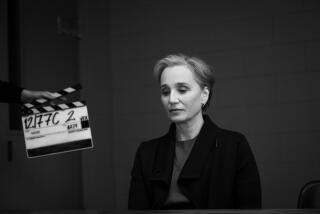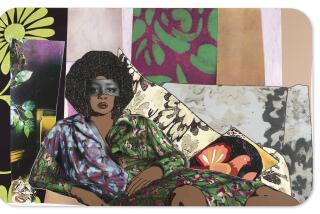Book review: ‘Our Tragic Universe’ by Scarlett Thomas
- Share via
Meg, the fortyish British writer worrying her life away in Scarlett Thomas’ eighth novel, “Our Tragic Universe,” has life crises to burn. Her shiftless whiner of a boyfriend, Christopher, hasn’t earned a crust in the seven years since she ditched a more dependable lover to live with him in Devon. Her best friend, Libby, suffers loudly through a love life as eventful as Meg’s is dull, while Meg weighs whether to pursue a simmering crush on Rowan, a much older, retired college professor who dithers between Meg and his live-in partner.
On the work front, the sci-fi teen mysteries that Meg ghostwrites to pay the bills have ballooned into the space reserved for the serious novel she keeps starting and deleting. Worse yet, she’s estranged from her friend Vi, a wiry anthropologist who keeps feeding her enigmatic Zen koans that may or may not be designed to lift her from the doldrums. To cap it all, she’s reviewing a book that posits the end of the universe as she knows it, and possibly the existence of an alternate one. So really, why bother to act, given that she might already be dead?
All this romantic, literary unease seems to offer a serviceable, if not terribly fresh blueprint for the usual head-scratching about loose-ended life in modern England. So it ought to be more fun than it occasionally is that this floundering crew comes swaddled in a heavy patchwork quilt of semiotic signage.
Like her protagonist, Thomas is also British and fortyish, and she has acknowledged that Meg’s struggles mirror her own efforts to transcend the well-received genre novels “PopCo” (2004) and “The End Of Mr. Y” (2006) that cemented her reputation after she appeared on a list of the top 20 best young writers of 2001 in the London newspaper The Independent. She is heavily schooled in deconstructionist cultural theory and it shows in a hefty prefatory quote from Baudrillard, and in her magpie tendency to snatch ideas, images and symbols from everywhere, mash them into the narrative and let the reader decide if everything’s random or symbolically connected. Deft as it is, there are times when this trickery weighs so heavily on the main story that it all but sinks the enterprise.
I get that Thomas is holding a conversation with herself in the search for new forms and meanings that better reflect the uncertainty of living in the cultural jumble that defines our age. But much of “Our Tragic Universe” plays out like an early Jane Campion movie, drained of the wicked satire or playful affection that comes with juggling pop signifiers.
While Meg agonizes over whether to plot or whether changing her life or writing her novel is worth the bother, you will learn more than you ever wanted to know about knitting socks, making jam, parsing the significance of Tarot cards, made-to-measure herbal blends that reflect temperament — and other New Age-y pastimes that come across as banal and girlish rather than womanly.
The effort to write the “storyless story” or “fictionless fiction” is a juicy conundrum for the Postmodern writer that has also provided fodder for cultural studies dissertations by the pound. But most of us look to fiction to hang a frame on the storyless stories of our lives, even if it’s not the heroic tales of transformation or self-help that Thomas finds foolish or obsolete.
Mercifully, after about 200 pages of discourse and wavering indecision, things start to happen — a hasty departure, a new home, a suicide, a touching connection with an autistic man that makes you wish all Thomas’ characters were this developed, or this surprising. There’s even a moment of action-adventure when an unidentified Beast starts roaming the countryside around Dartmoor. At the end, Thomas ingeniously gathers her major players, in old and new combinations, and walks them through a labyrinth that, even though it’s a symbolic clout over the reader’s head, suggests new patterns for telling stories that make you want to read her next book.
Taylor is a freelance writer in Los Angeles.
More to Read
Sign up for our Book Club newsletter
Get the latest news, events and more from the Los Angeles Times Book Club, and help us get L.A. reading and talking.
You may occasionally receive promotional content from the Los Angeles Times.










